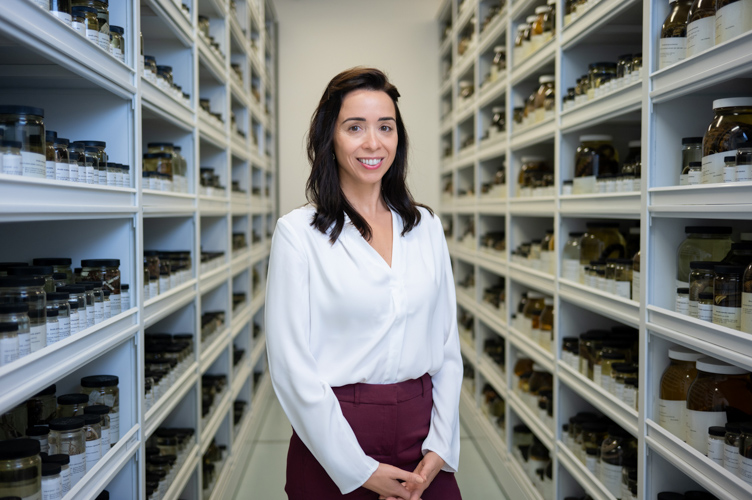About Martha's Work
Martha Muñoz is an evolutionary biologist investigating the factors that influence rates and patterns of evolution. Muñoz integrates behavioral observation in natural habitats and lab-based environments; analysis of morphological, physiological, and biomechanical traits; and phylogenetics to explore why some organisms and traits evolve rapidly while others remain unchanged for millennia. Her research with reptiles, amphibians, and fishes yields novel insights into the impact of behavior and biomechanics on evolution.
In early work with tropical anole lizards, Muñoz challenged the assumption that environmental pressures are the primary drivers of evolution. She showed that anole lizard species living in warm, sea-level habitats are not physiologically different from those living on colder mountaintops (i.e., the lizards on the mountains did not develop different bodily functions to tolerate the colder habitat). Instead, Muñoz found behavioral differences that enable both the mountaintop and sea-level lizards to thermoregulate in different habitats. The mountaintop lizards get warm by basking on boulders, and the sea-level lizards stay cool by sheltering from the sun in moist vegetation. Muñoz also determined that while mountain lizards’ physiological evolution was slowed by their behavior, their morphology (body structure) evolved rapidly. They developed shorter hind legs and flatter skulls, which enable them to hide from predators in rock crevices. Muñoz expanded on this work to examine adaptive radiation—rapid diversification into new species—among the anole lizards on Caribbean islands. Through phylogenetic analysis, she determined that it was not the island environment that enabled diversification but rather a functional innovation: adhesive toe pads that allowed the lizards to spread to new niche environments.
In another line of research, Muñoz demonstrated that biomechanical principles can also shape rates of evolution. She found that the jointed raptorial appendage (or forelimb) of the mantis shrimp does not evolve as one integrated system. The smallest component, or link, in the appendage evolves more rapidly than the others, and minute changes in its length have a disproportionately large impact on the force of the shrimp’s claw, which it uses to punch or stab prey. Her analysis of similar jointed systems in the jaws of over 100 fish species showed that the rates of evolution of the jaw components are controlled by whether the species needs more bite force or bite speed to catch their prey. Currently, Muñoz and her lab are working to better understand the role of behavior in evolutionary diversification using dozens of closely related species of plethodontid salamanders (lungless amphibians that breathe through their skin) living in niche microhabitats in the Appalachian Mountains. Muñoz is reshaping our understanding of evolutionary determinants and providing critical insights into how changing environments and the day-to-day behavior of organisms will impact long-term patterns of evolution.













